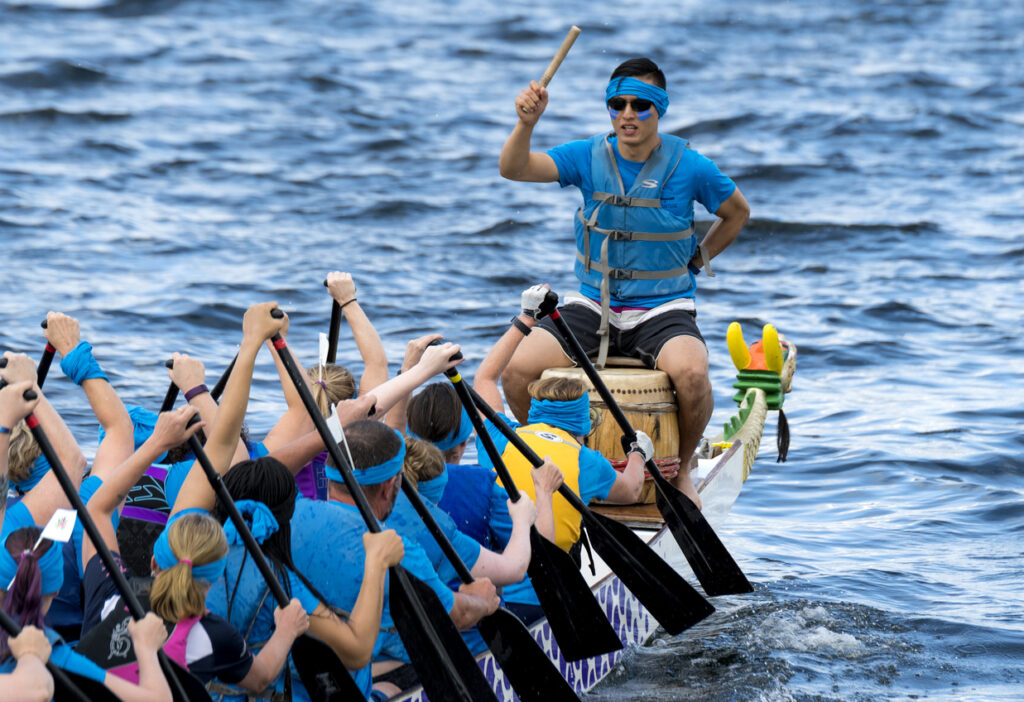“I lived in Hong Kong for ten years, and while I was there I set up a dragon boat team called The Sea Gods.
We were a fun team, and we did a lot of drinking! We were a group of friends. When we started we just paddled, and over about just three or four years we got a little bit better.
In the third year, we suddenly found ourselves winning one of the lower-ranked competitions. That was a really great experience and we realised that we wanted to push on each year.
People weren’t happy if they weren’t learning and you would lose people – they’d drift away to other things. So we started building on that.
We’d always had a mixed team, but there was only a men’s and a ladies’ competition. When they introduced a mixed category, I laid down the challenge of saying, ‘I want to win this’.
Most of the people in the team said that it just wasn’t possible. There was such a gap between ourselves and the other teams, and the other teams trained so hard.
I said, ‘no, I think this is possible and I think people are up for it’.
One of my very good friends said: ‘you’re not going to get people to turn up three times a week and put in these hours’.
I said: ‘they do for their rugby training, let’s try it’.
What I learned was that when you set a really aggressive goal, you put a framework in place for those people to make it achievable.
So we hired a coach that had trained Olympic athletes to do circuits.
A week before the event we were in a run-up race. There were seven teams, of which six were going to be at the main event.
We went out and we paddled, and we came sixth out of seven in that race. The difference that separated the first and the sixth boat, however, was half a second, literally.
We went out in the middle of that week and I said, ‘we can do this’.
We really practised and focused on our technique, and we won by a decent margin on the day.
In one of the semifinals, we beat the team that was probably the hardest to beat.
One of the girls on the boat was in floods of tears because she thought, ‘we can do this’. It was just an amazing feeling.
By pushing them harder, they were actually more inspired and they worked harder. That’s something I’ve learned for any team: people want to be pushed.
They work better when they’ve got an aggressive goal and they can really see themselves getting somewhere.
If you make it easy for people they tend to sit back, and they’re actually less happy and they’ll probably drift away”.
Watch the video for the full story here…
Paul Robinson has spent the last 20 years building businesses, mainly within the financial services and fund management sector. A keen social entrepreneur, Paul founded and helped build Global Ethics, an ethical goods company operating businesses under the One Brand, which has generated over £15m in donations. These experiences led Paul to found Alquity, a business that uses social responsibility as a competitive financial advantage.
This video is taken from the Clear Lessons video learning library. Clear Lessons is absolutely free for charities and anyone working or volunteering in the third sector. Corporate organisations can purchase a licence, which supports free access for charities. Find out more at ClearLessons.com.
“I lived in Hong Kong for ten years, and while I was there I set up a dragon boat team called The Sea Gods.
We were a fun team, and we did a lot of drinking! We were a group of friends. When we started we just paddled, and over about just three or four years we got a little bit better.
In the third year, we suddenly found ourselves winning one of the lower-ranked competitions. That was a really great experience and we realised that we wanted to push on each year.
People weren't happy if they weren't learning and you would lose people - they'd drift away to other things. So we started building on that.
We'd always had a mixed team, but there was only a men's and a ladies' competition. When they introduced a mixed category, I laid down the challenge of saying, 'I want to win this'.
Most of the people in the team said that it just wasn't possible. There was such a gap between ourselves and the other teams, and the other teams trained so hard.
I said, 'no, I think this is possible and I think people are up for it'.
One of my very good friends said: 'you're not going to get people to turn up three times a week and put in these hours'.
I said: 'they do for their rugby training, let's try it'.
What I learned was that when you set a really aggressive goal, you put a framework in place for those people to make it achievable.
So we hired a coach that had trained Olympic athletes to do circuits.
A week before the event we were in a run-up race. There were seven teams, of which six were going to be at the main event.
We went out and we paddled, and we came sixth out of seven in that race. The difference that separated the first and the sixth boat, however, was half a second, literally.
We went out in the middle of that week and I said, 'we can do this'.
We really practised and focused on our technique, and we won by a decent margin on the day.
In one of the semifinals, we beat the team that was probably the hardest to beat.
One of the girls on the boat was in floods of tears because she thought, 'we can do this'. It was just an amazing feeling.
By pushing them harder, they were actually more inspired and they worked harder. That's something I've learned for any team: people want to be pushed.
They work better when they've got an aggressive goal and they can really see themselves getting somewhere.
If you make it easy for people they tend to sit back, and they're actually less happy and they'll probably drift away".
Watch the video for the full story here...
Paul Robinson has spent the last 20 years building businesses, mainly within the financial services and fund management sector. A keen social entrepreneur, Paul founded and helped build Global Ethics, an ethical goods company operating businesses under the One Brand, which has generated over £15m in donations. These experiences led Paul to found Alquity, a business that uses social responsibility as a competitive financial advantage.
This video is taken from the Clear Lessons video learning library. Clear Lessons is absolutely free for charities and anyone working or volunteering in the third sector. Corporate organisations can purchase a licence, which supports free access for charities. Find out more at ClearLessons.com.





